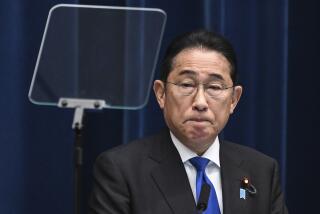Daiwa’s 2 Top Executives to Step Down
- Share via
TOKYO — Scandal-plagued Daiwa Bank announced the resignations of its president and chairman today, succumbing to pressure that they accept responsibility for a rogue trader in the bank’s New York office who lost $1.1 billion in illicit transactions and for subsequent efforts to hide the losses.
The resignations of Akira Fujita, 56, as of today, and Chairman Sumio Abekawa, 73, effective in March, were announced by the world’s 19th-largest bank, whose lax oversight of its own trading activities shocked Japan’s troubled banking industry.
Fujita is also wanted for questioning by the U.S. Federal Bureau of Investigation in connection with its investigation of the unauthorized bond trading incident, according to Nikkei Shimbun, Japan’s leading financial daily.
Though rumors that Fujita would resign were roundly denied just last week, the bank’s disclosure Friday that it had hidden records from regulators in a bid to pass inspections by the U.S. Federal Reserve Board appeared to make a shake-up at the bank all but inevitable.
Daiwa Vice President Takashi Kaiho, 58, was named to succeed Fujita, who will remain as an adviser to the bank. Kaiho today pledged efforts to restore the bank’s credibility.
The bank also said it plans to scale back its U.S. operation, including a suspension of U.S. bond trading, and to expand its Southeast Asian business.
The bank also announced that Managing Director Hiroyuki Yamaji, 54, and Kenji Yasui, vice president in charge of international operations, will step down.
In addition, Daiwa was expected to announce today that it has about $5 billion in non-performing loans, representing about 7% of its total outstanding loans. Among Japan’s major commercial banks, a 7% bad-loan ratio is considered relatively high. However, Daiwa’s general financial condition is said to be good.
Daiwa admitted Friday that U.S. and Japanese regulators knew as early as 1993 about deceptive dealings by Daiwa Bank’s New York operations--two years before the bond trader’s $1.1-billion loss surfaced.
A Daiwa official in Japan said that the bank told the Fed in 1993 that it had hidden some of its records and temporarily removed the bond trader and others from the New York branch in order to pass a 1992 inspection by the regulators.
Kaiho was named last week to head a panel of senior Daiwa managers commissioned to strengthen its in-house supervision over traders and transactions at its overseas branches.
The bank said last month that the New York trader, Toshihide Iguchi, 44, racked up the huge losses from 1984 to 1995 and hid the losses from his superiors by falsifying transaction books and records. Iguchi was then charged by U.S. prosecutors with forgery and falsification of bank records.
But Friday’s disclosure revealed how officials above Iguchi at the Osaka-based bank played a role in deliberately manipulating its books.
Iguchi allegedly concealed 30,000 unauthorized trades from regulators over the 11 years.
Fujita is a likely target for FBI questioning because he received a confession letter from Iguchi, Nikkei Shimbun reported.
But even if the FBI wants to speak with Fujita in its investigation, the bureau does not have authority to summon non-residents of the United States, so he could turn down the request, the paper said.
More to Read
Inside the business of entertainment
The Wide Shot brings you news, analysis and insights on everything from streaming wars to production — and what it all means for the future.
You may occasionally receive promotional content from the Los Angeles Times.








